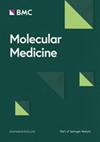补充支链氨基酸可通过 INFGR1/JAK1/STAT1 信号通路诱导胰岛素抵抗和促炎性巨噬细胞极化
IF 6
2区 医学
Q1 BIOCHEMISTRY & MOLECULAR BIOLOGY
引用次数: 0
摘要
肥胖症是一种全球性流行病,肥胖者脂肪组织的低度慢性炎症可导致胰岛素抵抗和 2 型糖尿病。脂肪组织巨噬细胞(ATMs)是脂肪组织中促炎细胞因子的主要来源,因此成为重要的治疗靶点。虽然支链氨基酸(BCAA)与人类肥胖和2型糖尿病密切相关,但BCAA分解与脂肪组织炎症之间的关系尚不清楚。本研究旨在探讨 BCAA 分解紊乱是否会影响脂肪组织巨噬细胞的功能和脂肪组织促炎细胞因子的分泌,并确定其潜在机制。这项研究将帮助我们更好地理解 BCAA 分解代谢在脂肪组织炎症、肥胖和 2 型糖尿病中的作用。在体内,我们研究了高脂饮食诱导的肥胖小鼠体内ATMs的BCAA分解代谢是否发生改变,以及补充BCAA是否会影响小鼠的肥胖、糖耐量、胰岛素敏感性、脂肪组织炎症和ATMs极化。在体外,我们从标准饲料组和高BCAA喂养组小鼠体内分离出ATMs,利用RNA测序技术研究BCAA积累调控的潜在分子通路。最后,我们进行了靶向基因沉默实验,并使用免疫印迹法验证了我们的发现。我们发现,高脂饮食诱导的肥胖小鼠会影响ATMs中的BCAA分解代谢酶,导致BCAA及其下游BCKA的积累。与标准饲料(STC)组相比,补充BCAA会导致肥胖和胰岛素抵抗。而高BCAA饮食会诱导脂肪组织分泌促炎细胞因子,包括肠间蛋白-1β(IL-1β)、肿瘤坏死因子α(TNF-α)和单核细胞趋化蛋白-1(MCP-1),并促进ATMs M1极化(促炎表型)。转录组分析表明,高BCAA饮食会激活IFNGR1/JAK1/STAT1通路,而IFNGR1特异性沉默可消除BCAA补充剂诱导的炎症和ATMs M1极化。肥胖小鼠模型显示,BCAA 的分解代谢被破坏会导致 BCAA 的积累,而高水平的 BCAA 会促进 ATMs M1 极化并增加脂肪组织中的促炎细胞因子,从而进一步导致胰岛素抵抗。因此,降低循环中的 BCAA 水平可以作为肥胖和胰岛素抵抗患者的一种治疗策略。本文章由计算机程序翻译,如有差异,请以英文原文为准。
Branched-chain amino acids supplementation induces insulin resistance and pro-inflammatory macrophage polarization via INFGR1/JAK1/STAT1 signal pathway
Obesity is a global epidemic, and the low-grade chronic inflammation of adipose tissue in obese individuals can lead to insulin resistance and type 2 diabetes. Adipose tissue macrophages (ATMs) are the main source of pro-inflammatory cytokines in adipose tissue, making them an important target for therapy. While branched-chain amino acids (BCAA) have been strongly linked to obesity and type 2 diabetes in humans, the relationship between BCAA catabolism and adipose tissue inflammation is unclear. This study aims to investigate whether disrupted BCAA catabolism influences the function of adipose tissue macrophages and the secretion of pro-inflammatory cytokines in adipose tissue, and to determine the underlying mechanism. This research will help us better understand the role of BCAA catabolism in adipose tissue inflammation, obesity, and type 2 diabetes. In vivo, we examined whether the BCAA catabolism in ATMs was altered in high-fat diet-induced obesity mice, and if BCAA supplementation would influence obesity, glucose tolerance, insulin sensitivity, adipose tissue inflammation and ATMs polarization in mice. In vitro, we isolated ATMs from standard chow and high BCAA-fed group mice, using RNA-sequencing to investigate the potential molecular pathway regulated by BCAA accumulation. Finally, we performed targeted gene silence experiment and used immunoblotting assays to verify our findings. We found that BCAA catabolic enzymes in ATMs were influenced by high-fat diet induced obesity mice, which caused the accumulation of both BCAA and its downstream BCKA. BCAA supplementation will cause obesity and insulin resistance compared to standard chow (STC) group. And high BCAA diet will induce pro-inflammatory cytokines including Interlukin-1beta (IL-1β), Tumor Necrosis Factor alpha (TNF-α) and monocyte chemoattractant protein-1 (MCP-1) secretion in adipose tissue as well as promoting ATMs M1 polarization (pro-inflammatory phenotype). Transcriptomic analysis revealed that a high BCAA diet would activate IFNGR1/JAK1/STAT1 pathway, and IFNGR1 specific silence can abolish the effect of BCAA supplementation-induced inflammation and ATMs M1 polarization. The obesity mice model reveals the catabolism of BCAA was disrupted which will cause the accumulation of BCAA, and high-level BCAA will promote ATMs M1 polarization and increase the pro-inflammatory cytokines in adipose tissue which will cause the insulin resistance in further. Therefore, reducing the circulating level of BCAA can be a therapeutic strategy in obesity and insulin resistance patients.
求助全文
通过发布文献求助,成功后即可免费获取论文全文。
去求助
来源期刊

Molecular Medicine
医学-生化与分子生物学
CiteScore
8.60
自引率
0.00%
发文量
137
审稿时长
1 months
期刊介绍:
Molecular Medicine is an open access journal that focuses on publishing recent findings related to disease pathogenesis at the molecular or physiological level. These insights can potentially contribute to the development of specific tools for disease diagnosis, treatment, or prevention. The journal considers manuscripts that present material pertinent to the genetic, molecular, or cellular underpinnings of critical physiological or disease processes. Submissions to Molecular Medicine are expected to elucidate the broader implications of the research findings for human disease and medicine in a manner that is accessible to a wide audience.
 求助内容:
求助内容: 应助结果提醒方式:
应助结果提醒方式:


